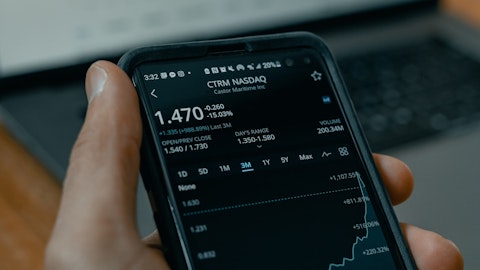Robert Berkley: Fires?
Ryan Tunis: Yes.
Robert Berkley: So it was a frequency — it was a frequency of severity on a gross basis. And honestly, we — it wasn’t concentrated in any one of our operations. And I’m not a big believer and good luck and bad luck, which is why we are digging.
Ryan Tunis: Got it. Thank you.
Robert Berkley: Thanks for the question.
Operator: We’ll go now to Josh Shanker of Bank of America.
Joshua Shanker: How are you all doing? Thanks for taking questions.
Robert Berkley: Actually, good evening, Josh.
Josh Shanker: Look, earning references, — what you guys do is hard. It’s a very competitive process with a lot of transparency and it’s quite attractive. You’re not the only ones who want to write that business. I think about four quarters ago or maybe five, you said that you felt that, broadly speaking, your book got to the rate accuracy you wanted, and you’re now pivoting to the growth phase and exposures on a backward-looking basis, did you grow as much as you wanted to with the opportunity set as you thought it was? I look at the premium growth this quarter, the lowest quarter of the year, it’s been better throughout the year. But it seems like it’s kind of pacing with your pricing trends on renewals, and there is a new business baked into there as well. Have you been able to grow with the nasty that you hoped a year or 15 months ago when you sort of announced that of it?
Robert Berkley: Well, Josh, to be perfectly frank, you remember what I say, better than I remember what I say. Nevertheless, I’m sure you’re correct. And obviously, we all look out and we try and anticipate and we try and figure out what does that mean? I think in hindsight, you always say to yourself, well, I could have done this. We could have done that. Maybe we want to squeeze a little bit more juice out of the orange and hopefully, that’s a learning opportunity to find new mistakes to make in the future as opposed to repeating old ones and no one’s effort to optimize. To make a long story short, I think in many pockets of the organization, we did really well and trying to make the most of it. I think there are some pockets of the organization where we did really well quite frankly, being disciplined and letting business go.
As I suggested earlier in the call, we have different cycles going on — same cycles but different products at different points in the cycle. I think one of the pieces that we anticipated but not fully, call it, whatever, 15 months, 18 months ago, I think that we did not fully appreciate what was going to be happening with loss trend, particularly inflation. We were talking about social inflation, and I think we had our finger on that pulse. I think economic inflation, we saw it coming, but it proved to be even more than we had expected. So I think those would be two things that when I made that prediction, those were realities we had to factor in even more along the way than I had when I had suggested it. But I think there are parts of our business, particularly our E&S businesses and others and many of our specialty businesses that I think have done a great job getting a lot of traction.
On the other hand, I strongly applaud, for example, our colleagues that are focused on workers’ compensation and the discipline that they have exercised. Yes, when you look at one of the pages in our release, you see the comp line growing, but that’s really driven by payroll. If you look at the number of accounts, that product line has really shrunk for us because of my colleague’s discipline. So directionally, it played out the way for a lot of product lines, I would have anticipated degree wise, there are places where I thought the ports (ph) was going to be hotter and there are places where I thought it was going to be colder.





